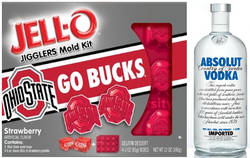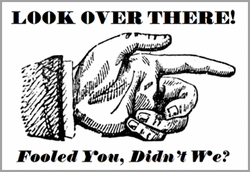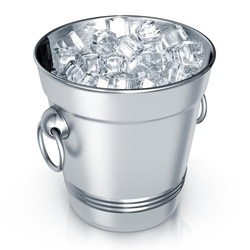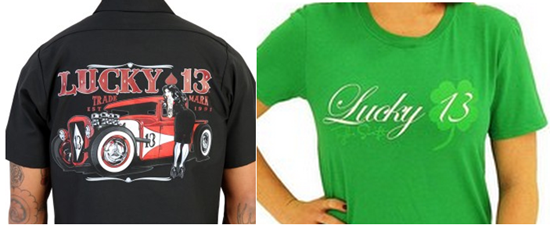|
Taylor Swift is probably asking herself the same question that Clint Eastwood famously asked in Dirty Harry. At least that’s what her attorneys might have told her when she sought to use LUCKY 13, a little-known trademark for a boutique line of clothing, on greeting cards and clothing items, of all things. LUCKY 13 belongs to a company called Blue Sphere. While many people may not have heard of LUCKY 13, Blue Sphere claims to have some heft behind the name, having done business in Southern California for over 20, and having a robust licensing program and 6 federally registered trademarks to back it up. Oh yeah, the company has also participated in a lot of charitable activities by donating retail items to different causes. All of which was done (presumably) to increase the amount of goodwill (the intangible goodies associated with a trademark, not the store) associated with Lucky 13. So why did Taylor Swift (and American Heritage, a premier greeting card company) feel the need to use LUCKY 13 and risk the ire of Blue Sphere?
 Thanks to the "TaxProf" Blog for this Pic. Thanks to the "TaxProf" Blog for this Pic. Jell-O, it’s the fun way to enjoy an after-school snack. With Bill Cosby sporting a bow-tie and tuxedo graced by similarly-dressed kids stuffing their faces with gelatin molds in the shapes of dinosaurs and giant lips, how could you resist buying a box or two on your next trip down the aisle at Wal-Mart? After all, it’s the snack that’s so easy to make “a Child Can Prepare it.” Jiggling fruit gel molded into funny shapes. Good, clean family fun, right? At least, that’s the image that Jell-O enjoyed for the first 100 years of its existence. As many who enjoy a good party now and then can tell you, the demographic for Jell-O has shifted ever so slightly from housewives and dessert-loving kids to college students, ravers, and club hoppers. Ergo, people who enjoy preparing a libations in the form of gelatinous molds. With such a shift you would think that Jell-O may have noticed, and may have seized on the opportunity to correct a trend that promises to potentially take the Jell-O trademark into the abyss of genericide (I know, I use that term a lot, but the ominous nature of the topic deserves repeating). Instead, it looks like they are doubling down on a co-branding initiative with various universities across the U.S. to promote Jell-O molding kits that include university molds. As a well-known trademark attorney has remarked, there appears to be some double-speak about Jell-O’s true demographic here, or at least the real reason behind this initiative. After all, we know what most food items bearing university insignia (or any type of sports insignia) go hand-in-hand with one of America’s favorite pre-game past times: tailgating. And what does Jell-O and tailgating have in common? If you said most-creative mold making contests, you are wrong.  It seems like I have been getting a lot of questions (or hypotheticals) lately that involve pointing the finger at someone else. When I point the finger, I don’t mean in a whistleblower type of way but as in the type of finger-pointing that goes on when we are teenagers: “Johnny was out with his girlfriend until midnight. If he can do it, why can’t I?!”. These types of questions don’t begin with the premise that what you are doing may not be right and they are usually designed to uncover the mystery of another person’s tactics. You know the response that I got when I asked this question? “Son, you aren’t them. If they were our son, they aren’t living by our rules.” What is remarkable is this same type defense often arises when people talk about trademarks. The defense is usually brought up by a would-be infringer as a way to distract from the real issue (which is that they are infringing in the first place). The line usually goes something like this: I see so many other people misusing a trademark in the media and they aren’t called-out by ABC company. If they are getting away with it, I should be able to get away with it, too. This defense is about as effective as explaining away highway speeding by pointing at other people passing you by at 85 while a cop is writing you a ticket for going 75. The fact is some trademark owners have a lot of ground to cover.
 Millenials and other people who loved 90s music will probably recognize the title as a hit song from the eccentric musical group Primus. The phrase is an offshoot of the phrase “your name is mud” which, as I found out when doing some due diligence for this post, was not coined by Dr. Samuel Mudd, the man who treated John Wilkes Booth after his assassination of Lincoln. But I digress. Brand owners and people who have popularized their likeness have a strong interest in protecting their name from being drug through the mud. If a brand is allowed to be drug through the mud, be it by the brand owner itself or someone who the brand owner has allowed to use the trademark, the trademark may become so weak and unable to identify the original source that it is deemed to be lost. When this happens, all the goodwill that a brand owner has developed over the years and all the millions of dollars that went into building the brand are forfeited to the dreaded pit of abandoned trademarks.  The phrase “ice bucket challenge” has taken the world by storm this summer. Videos of people dousing themselves in ice water and nominating friends and family to do the same have inundated social media pages for millions, helping ALS reap the benefits in the form of millions of dollars of donations and increased awareness. I have personally done the ice bucket challenge and you can consider this blog post a virtual douse for the blog (electricity and water, in reality, don’t mix so well). ALS has clearly profited from this campaign that began as a way for golfers to raise money for assorted charities and any group that garnered that kind of attention could be expected to “press its luck” to find more success. This may have been the motivating factor behind the ALS Association’s decision earlier this month to file trademarks applications in the U.S. for the phrase “Ice Bucket Challenge” for services related to charitable giving. Is this attempt to capitalize on a wave of attention and recognition enough to throw ice water on charitable motives? Some of my fellow members of the bar seem to think so. Erik Pelton, a trademark attorney in the Washington D.C. area thinks that the attempt by ALS is a move that will prevent other people from using the trademark for charitable drives.  You may hear often about patent trolls in the media. Patent trolls (also referred to more formally as “Non-Practicing Entities” because of their tendency to not practice the invention that they own rights to) are persons or entities that acquire and enforce patent rights against accused infringers in an attempt to collect licensing fees. A patent troll is not interested in manufacturing a product or engaging in a process under the patent that they have acquired. Rather, their sole interest is to engage in a kind of economic rent-seeking, searching out collecting fees from entities that are practicing the patented invention. For this reason, patent trolls are often charged with the claim that they are impeding innovation and harm the ability of companies to deliver products that consumers demand at the lowest price. A glaring problem that many trademark owners face, but which does not appear to have garnered the same degree of attention in the media, are trademark trolls. Trademark trolls are individuals or entities that seek out the names or symbols belonging to well-known third parties with the sole intention of deriving value from the trademarks through licensing back to the true owner or selling the trademarks and other related properties (including domain names) to the trademark owner. There are some fundamental differences between patents and trademarks that make it slightly more difficult for trademark trolls to accomplish their goals effectively. In the trademark troll world there are three types of bloke :
It seems like I have had a lot of conversations with people lately about movie and book titles. No, not in the form of trivia questions; I mean conversations about how so many movie titles just seem to sound the same. Or a related topic: how can a movie studio come up with a title for their movie when there are already so many other movie titles out there? In a universe with a finite list of words and phrases, how does a “Title”ist (fancy moniker for somebody who writes film titles, according to me) expand their wings?
Here is just a short list of titles that overlap: 28 days vs. 28 Days Later Monsters Inc. v. Monsters Ball Aristocats vs. Aristocrats Black Sheep vs. Black Sheep But wait a second: aren’t names and such (anything that is a creative work) protected by copyright? Nope, not really short phrases, of which titles, be it a book or movie title, falls victim. Names and short phrases such as “Live, love laugh” just don’t exhibit enough creativity to be protected in the same way that a full-length book or movie is. Or at least that’s what the Copyright Office has specifically declared in its decree that all words embody a “minimum amount of authorship in the form of original literary, musical, pictorial, or graphic expression.”  In case you hadn’t heard: the Trademark Trial and Appeals Board (TTAB, an administrative body affiliated with the trademark office that hears all appeals directly from the United States Trademark Office regarding the decisions of trademark examiners) dropped a real whopper of an opinion yesterday when it concluded that a series of trademarks containing the word “REDSKINS” must be cancelled because the trademark was disparaging to Native Americans at the time it was registered. I have a few issues with how the press has been covering this story along with some additional comments on the general soundness of the opinion (although a decision this substantial will surely be appealed by the Redskins). So here is my take. In honor of Flag Day, I thought I would put a little trademark lawyer spin on my homage to Old Glory.
You might see many trademarks or logos that incorporate elements of the American flag or elements of other national flags. Because airlines are the easiest types of examples to think of (because some airlines typically brand themselves as the namesake carrier for a particular country), I will use airplane livery as an example. American Airlines and U.S. Airways (about to be merged into one airline, if you hadn’t heard) sport elements of the red, white, and blue: Lately I’ve been bombarded with recurring questions about whether a business name (or a trade name) suffices as a trademark. Although I feel like an economist when I say this, the answer is “yes” and “no”.
First to clear the air, I am going to run-through a definition of each type of designation, in a Merriam-Webster-esque style: Trade Name: very simply, a trade name is the name or designation attached to a business. Many states allow you to register a trade name. The purpose of registering the trade name is, of course, to prevent other people/entities from adopting the same name and using it to steal customers from the true entity. Trade names do not afford any brand name protection or even provide you with unlimited rights to use the name (more on this later). Business Name: a business name is the designation that you provide to the Secretary of State (or the Corporation Commission, if in Arizona) when you formally establish a business. There are certain naming requirements (such as including the word “Corp” or “LLC”, depending on the underlying entity), but the business name by itself does not have to be distinctive in order to be approved. Generally speaking, the name of the business can be similar to others (i.e. “Assured Home Inspections” vs. “Assured Home Inspectors”), there just can’t be direct overlap between two names. |
What is generic?A generic trademark or brand is a mark that has become synonymous with the name of a product or service, usually without the trademark owners' intent. As a trademark owner, you want to avoid allowing your brand to become generic. Avoid it like the black plague. Mr. Anti-Generic HimselfThe brains behind this online operation and namespace for, er, cool name ideas is Justin Clark. He is an attorney at the J. Clark Law Firm and plays a mad drum solo from time to time. Archives
September 2019
Categories
All
DISCLAIMER
THIS SITE IS ONLY A BLOG AND IS NOT MEANT TO CONSTITUTE LEGAL ADVICE. IT IS ALSO PARTIALLY AN ADVERTISEMENT FOR LEGAL SERVICES BY ME, JUSTIN CLARK, ESQ. BUT I AM NOT YOUR LAWYER AND YOU ARE NOT MY CLIENT. ALSO, THE PHRASE "MR. ANTI-GENERIC" IS MEANT TO MEAN INTELLECTUAL ENTHUSIAST AND IS NOT MEANT TO SUGGEST THAT I HAVE CERTIFIED OR OTHER EXPERTISE IN ANY PARTICULAR FIELD OF LEGAL PRACTICE. |






 RSS Feed
RSS Feed